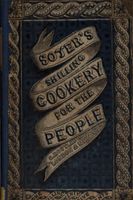My Dear Eloise,—My last letter you must have misunderstood. I did not mean that roasting before the fire should be entirely done away with, but that, on the score of economy, it should not be practised in the cottage, but that my new plan of semi-roasting should be followed. I was the more particularly led to these remarks, from having, last Sunday, immediately after church, visited several colliers’ cottages belonging to a Mr. Pope, close to this place. My motive for doing so was to see the economy of the cottage, as well as the kind of food they had for dinner. The first I went into had a piece of the belly or flap of beef, just taken down from a dangle, having been roasted. It was lying in the dripping pan, and was a great deal over done; in fact, dried. Noticing, in the course of conversation, that the fire was spoiling it still more, I took a plate from the table, and placed it against it, so that it should not burn. The old lady noticed my proceeding, and asked me if I was going to have a bit of dinner with them? “No, thank you, my dear madam,” replied I. “Then let me take away the plate, as it will spoil our dinner.” “How do you make that out?” I asked. “Well, the fat is not yet half out of the meat, and my Thomas will not eat fat, unless it is dripping in the crust of pies or puddings.” I then perceived that the meat was, in their estimation, a second consideration, and that they paid the price of beef for the fat, paying eightpence per pound for the meat, when they could get the fat at fivepence. There was scarcely any nutriment left in the meat—that which weighed five pounds before roasting, weighing hardly three pounds when done. There were seven to dine off it—the grandmother, the two parents, and four children. There was, besides, a few potatoes galloping on the fire—no other vegetable, and no puddings or sweets for the children, but excellent home-made bread, and not bad small beer. You may now perceive that some little improvement in this style of cookery would be an immense saving to these cottagers, and out of the three shillings and fourpence they paid for the beef, if done in the pan, with a pudding and potatoes under, and the meat not quite so fat, they would have got a good dinner and plenty for the next day, either hot or cold. If they wanted dripping, they could get fat at four or fivepence, instead of eightpence, and prepare it as No. 464c. It will keep for a long time, without turning sour.


